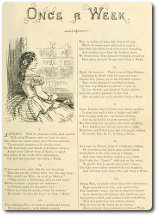Christina Rossetti, selected poems Contents
- Social / political context
- Religious / philosophical context
- Literary context
- A Better Resurrection
- A Birthday
- A Royal Princess
- At Home
- Cousin Kate
- Despised and Rejected
- Echo
- Goblin Market
- Good Friday
- Jessie Cameron
- L.E.L
- Maude Clare
- Remember
- Shut Out
- Song (When I am dead, my dearest)
- Summer is Ended
- The Convent Threshold
- The Lowest Place
- To Lalla, reading my verses topsy-turvy
- Twice
- Up-hill
- Winter: My Secret
'Maude Clare' - Synopsis and commentary
Synopsis
The poem recounts the story of two women, Maude Clare and Nell. They are both in love with the same man, Sir Thomas, who has chosen to marry Nell. On his wedding day, Maude turns up with wedding gifts consisting of the gifts he had presented to her through the course of their unfulfilled courtship. She declares to Nell that she can have what is left of the love Maude and Thomas shared. However, Nell asserts that she loves her husband enough to overlook his past.
Investigating Maude Clare
- How surprising do you find Maude Clare's behaviour?
- How do you account for it?
- How much sympathy do you feel for Nell?
Commentary
Textual history
 Rossetti composed Maude Clare between 1857 and 1858 and first published it in Once a Week, in 1859. This was an illustrated magazine which often contained serialised fiction as well as poetry. Rossetti later published Maude Clare in her first collection of poetry, Goblin Market and Other Poems, in 1862.
Rossetti composed Maude Clare between 1857 and 1858 and first published it in Once a Week, in 1859. This was an illustrated magazine which often contained serialised fiction as well as poetry. Rossetti later published Maude Clare in her first collection of poetry, Goblin Market and Other Poems, in 1862.
The original manuscript version of the poem contained forty-one stanzas. When it appeared in Once a Week it had been cut to fifteen and when it appeared in Goblin Market and Other Poems it had been cut again to only twelve.
Women and Victorian marriage
Many Victorians considered marriage to be at the centre of a stable society. It was widely believed that a happy family contributed to the well-being of the country. At a time when most women were forced to rely on men for their financial upkeep since most jobs were closed to them, a good marriage was important. Singleness was often not accepted as a legitimate choice a woman could make. Instead it was seen as a last resort. It was generally believed that if a woman was unmarried she was somehow not complete.
Investigating Maude Clare
- How do account for Nell's pride?
- Why do you think that it was making her ‘pale'?
- How do you think Nell felt when Thomas ‘gazed long on pale Maude Clare' (line 15) before he kissed her?
- Why do you think Nell went ahead with the wedding?
